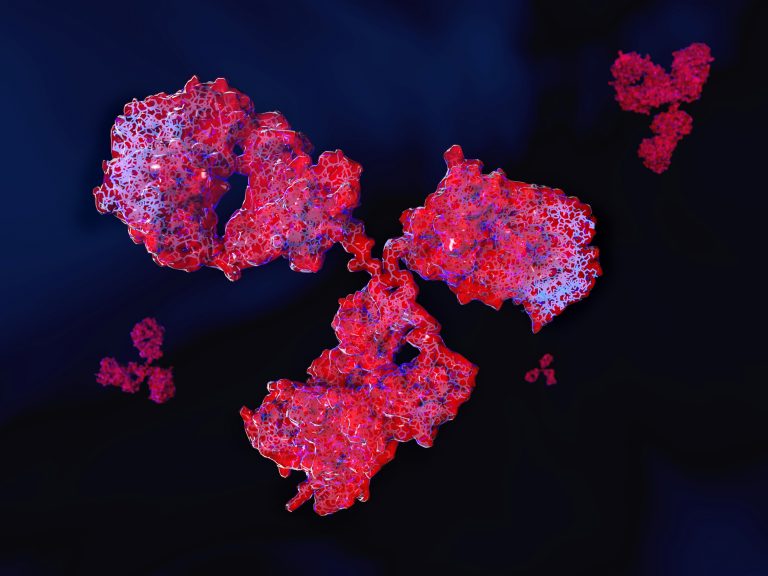
With the UK government reportedly now sitting on £millions-worth of imported coronavirus antibody test kits that proved unreliable under scrutiny, home-grown diagnostics firm Mologic is poised to start commercial-scale manufacture and rollout of both its laboratory ELISA, and low-cost—potentially £1 per test—lateral flow point-of-need coronavirus antibody tests, which could be available in the UK within weeks.
A commercial-scale manufacturing infrastructure for both tests is now in place, and data from independent validation studies by St. George’s University of London (SGUL) and the Liverpool School of Tropical Medicine (LSTM) are undergoing U.K. government evaluation prior to launch. “Public Health England is reviewing the data,” Mologic medical director Joe Fitchett, Ph.D., told Clinical OMICs. “We are awaiting validation and approvals prior to supplying to the U.K. government.” Both tests are designed for professional use, but when asked about a home-use test, Fitchett said, “We are on track for a June launch, subject to meeting or exceeding U.K. government and MHRA performance criteria.”
Coronavirus antibody tests indicate whether someone has previously been infected with the virus. Mologic’s laboratory ELISA test detects IgG to SARS-CoV-2 in serum or plasma, and generates results within 1.5 hours. The point-of-need test uses lateral flow technology to detect IgG, IgM and IgA SARS-CoV-2 antibodies in blood, serum or plasma, within 10 minutes. (Mologic co-founder and CSO Paul Davis developed the Clearblue pregnancy test which, when launched in 1988, was world’s first commercial application of lateral flow technology.)
“The laboratory ELISA offers us high throughput and scale to support patient, healthcare worker, and population testing for SARS-CoV-2 seroconversion using serum or plasma,” Fitchett explained to Clinical OMICs. “The rapid test allows decentralised testing at point of need using blood, serum or plasma … Depending on the setting, we are aiming to make the rapid test available for as little as £1, or as near as possible subject to supply chain considerations.” Data from the SGUL and LSTM validation studies, one of which indicated 99% sensitivity and 98% specificity for the laboratory ELISA, are due to be released within days. “An open access publication will be submitted this week,” Fitchett acknowledged.
With launch of both professional-use tests imminent, a home-use antibody detection kit, and a rapid point-of-need antigen-detection test to identify current infection also shouldn’t be far behind. “A home use test is under development and will be launched soon, as well antigen tests at point-of-need that are on track for June,” Fitchett reiterated. The firm’s rapid antibody and antigen tests have been developed with support from £1 million in funding through the U.K. government’s £46 million international coronavirus (COVID-19) prevention and research funding package.
The partnership between Mologic, the Liverpool School of Tropical Medicine and St. George’s University of London has been instrumental in expediting development of the assays, and work with partners around the world will help accelerate international programs. “We have developed a unique partnership with LSTM and SGUL that has allowed us to rapidly iterate, improve, and validate our technology in 8 rounds of large-scale evaluation in 4 weeks,” Fitchett explained. “In addition, we have validation partners on each continent to support the development of the right intended use for each test.” Global validation partners include the Wuhan Institute of Virology and the University of Malaya in Asia; and Fiocruz, for Latin America.
The first generation laboratory ELISA for SARS-CoV-2 antibodies will be manufactured by U.K. firm Omega Diagnostics. The partners aim to ramp up capacity to enable a U.K. throughput of up to 46,000 results per day, “with a view to scale further subject to demand,” Fitchett acknowledged. Mologic is also making the technology and materials for its tests available for use in Africa through its partnership with the Institut Pasteur de Dakar in Senegal, which has been working to validate the laboratory tests and will also manufacture the rapid point-of-need test at a new production site, DiaTropix, in Senegal. “The point-of-need test will jointly be manufactured with the IP Dakar from June,” Fitchett said. Mologic maintains that the collaboration represents the first time that a diagnostics kit created in the U.K. would be jointly manufactured in Africa. “The launch of Mologic’s laboratory-based test for COVID-19 is an exciting development in our efforts to support the global pandemic response,” commented Davis in a recent statement. “With the capability to process tens of thousands of tests results every day, these kits will relieve immediate testing pressures in the UK and Africa.”
The antibody tests could play a significant role in tracking coronavirus spread, and may make up a significant proportion of the 100,000 coronavirus tests per day that the U.K. government hopes to achieve by the end of April as part of its “five pillar plan” for mass testing in the country, Mologic believes. “Our tests have a high negative predictive value for community testing, so a negative test is considered highly reliable,” Fitchett explained. “Positive tests in the community may need a confirmatory test or to be performed as part of a clinical algorithm (for instance with clear signs and symptoms prior to use to optimise their interpretation). In the hospital setting the tests both benefit from a high negative predictive value and a high positive predictive value, due to the high prevalence of COVID-19 in clinical and care settings.”













